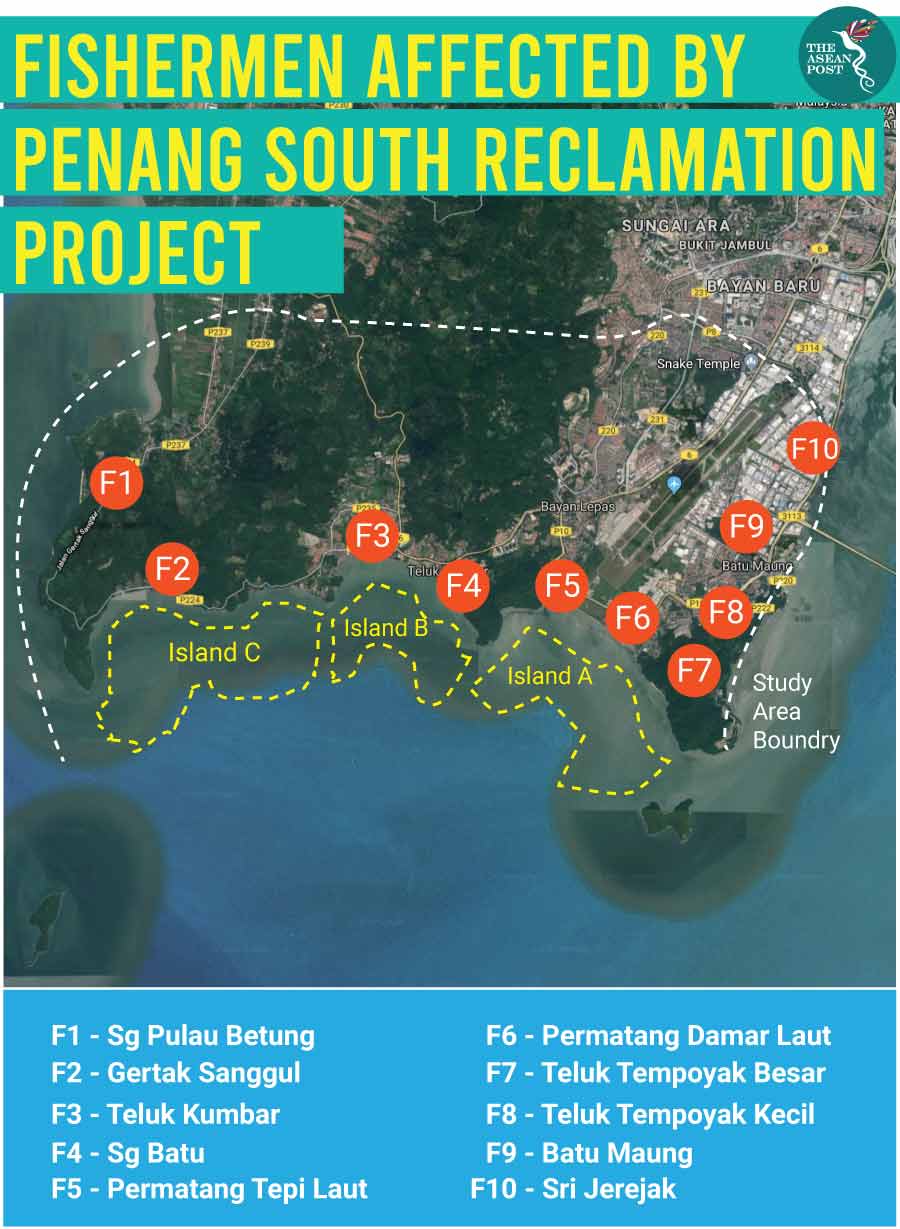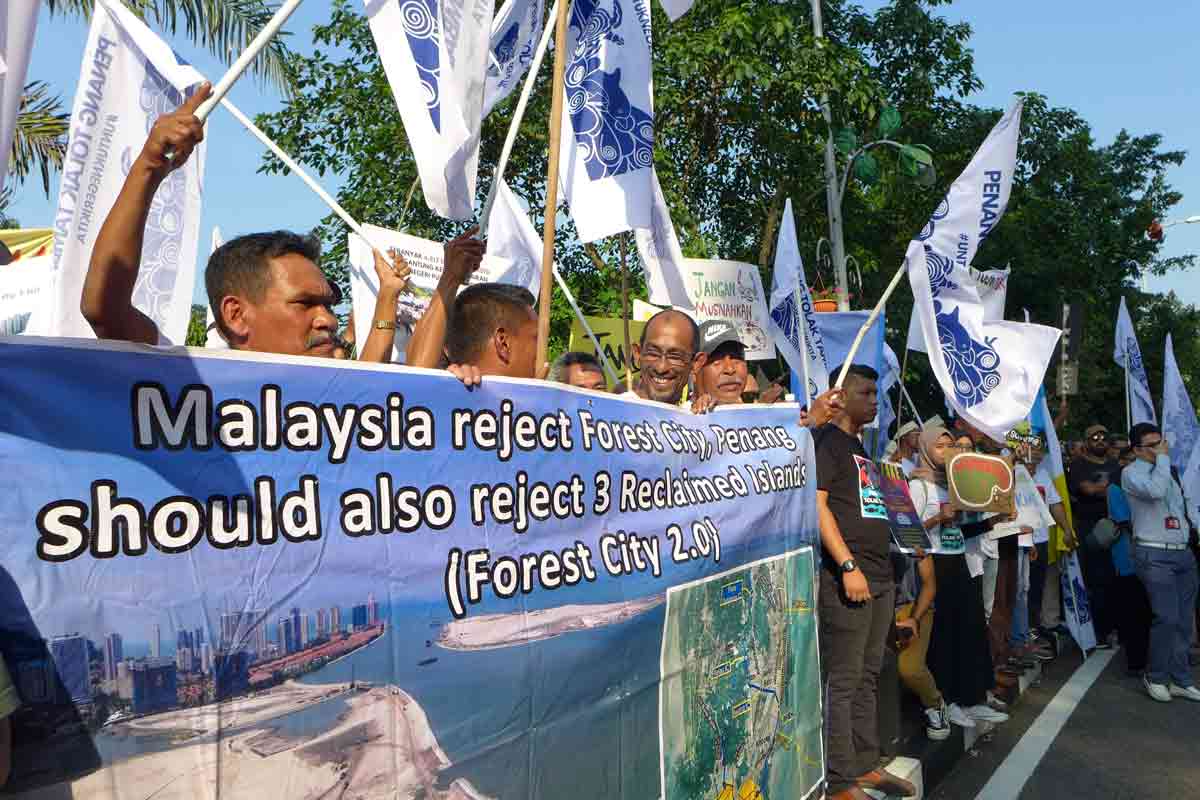More than 350 people, comprised of 200 fishermen from the states of Penang and Perak, and representatives from various organisations, marched to Malaysia’s Parliament in Kuala Lumpur, last week, to protest against the Penang South Reclamation (PSR) project and the sand mining project in Perak.
The PSR project involves the materialisation of three artificial islands with a total land area of 4,500 acres which will be sold to fund an RM49 billion (US$11.9 billion) megaproject, the Penang Transport Master Plan (PTMP).
During the protest, representatives from the group submitted memorandums to several ministers. Prime Minister Mahathir Mohamad said, following the march, that the government will look into the PSR project to confirm whether actual harm is being done to the fishermen and the environment.
Early in July 2019, Penang Chief Minister, Chow Kon Yeow, confirmed that he received a faxed approval letter from the Environment Department (DoE) based on the findings of the PSR Environmental Impact Assessment (EIA) report. The approval comes with 72 conditions which have to be implemented before the project can commence. The Consumers Association of Penang (CAP) and Sahabat Alam Malaysia (SAM) questioned the approval from the DoE, citing that fundamental issues had not been addressed such as the impact of the project on marine resources and the livelihoods of the fishermen.
What is at stake
Fishermen affected by the PSR – do exist in big numbers – and they want to be heard. Mohideen Abdul Kader, acting president of CAP says that the PSR is a mega project which will affect fishermen’s living, depleting fish stocks and thus increasing the prices of fish.
Fishermen affected by the PSR project are native to Penang Island South, who are traditional fishermen or ‘nelayan tradisi’ that use small boats and operate within eight nautical miles from the coastline. They operate there because the marine life is plentiful. Marine life will spawn in the area before making their way to waters of northern Perak, contributing to the fish landings of the fishermen in that state. The immediate ‘impact zone’ are fish landings in Gertak Sanggul, Teluk Kumbar, Sungai Batu and Permatang Damar Laut. However, other fish landings will also be affected.

Land reclamation will involve sand mining activities and filling works which will affect fisheries in Penang as well as in the neighbouring state of Perak. Professor Zulfigar Yasin from Universiti Sains Malaysia (USM) has said that the PSR’s EIA should have covered a larger area as the sea cage fish farms in Batu Kawan, aquaculture in Pulau Aman and north Perak will be affected.
A petition was initiated by Khoo Salma Nasution from the Penang Forum, a loose coalition of Non-governmental organisations (NGOs), to object against the PSR project. The petition has now gathered 48,000 signatures. The petition also points out that the livelihood of 4,817 inshore fishermen in Penang along with 6,000 in Perak is at stake.
Nazri Ahmad, chairman of the Fishermen’s Association of Penang, urged the government to respect the rights of fishermen, explaining that “the ocean is our source of provision.”
In May 2019, state exco Dr Afif Bahardin claimed that more than half of the fishermen affected by the proposed PSR have voiced their support, though no indication was given to how these numbers were obtained. He added that what the majority of fishermen wanted was not to continue catching fish but compensation. If the numbers he obtained were from the EIA report, then it would be premature to suggest that half of them (the fishermen) had agreed to the project, considering the higher number of fishermen – who did not agree and questioned the proposed project – were left out of the equation.
According to a Penang Institute study on the Aquaculture Industry by Negin Vaghefi, a senior analyst of economic studies, the number of people who depend on fisheries and aquaculture for their livelihoods is probably greatly underestimated.
There have been claims that the PSR proposed area has been overfished, thus discrediting the plight of the Penang fishermen. Yet, according to the EIA report, the fish landing in the study area amounted to 4,169.37 tonnes in 2015, with an estimated wholesale value of RM42 million (US$10.2 million). According to a fisherman, Isa Hussein from Sungai Batu, the area is rich in prawns. Perhaps this marine richness is reasoning that foreign fishing boats have been caught illegally in the surrounding area.
Compensation, then mitigation
Within the conditions stipulated for the approval of the EIA was a compensation package for the fishermen, in cash or other forms. Nazri has said that receiving compensation will make them look like beggars which they are not. “We just want to continue being fishermen,” he said. There have also been efforts to train them for other jobs, such as providing water taxi services.
Dr Afif says that they are looking at mitigation efforts to recreate breeding grounds to “offset the ecological effects.” But according to Evelyn Teh, an environmental and urban researcher, “the proposed Pollution Prevention and Mitigation Measures (P2M2) suggestions in the EIA are only as good as its projections and its function in theory.” She added that “one would wonder how it is possible for the hatcheries, cage cultures and fisheries to operate in a continuously deteriorating marine environment for as long as 15 years. This is notwithstanding the fact that the coastal habitats for fishes, crabs and shrimps would have then be buried under the reclamation.”
Mitigation efforts cannot replace the richness of biodiversity that is going to be destroyed in a short time. And it is arrogant to think fishermen should ‘polish up on their resumes and take up desk jobs.’ They are the few traditional fishermen left in the area, and the PSR project will gravely impact them and other fishermen in surrounding areas. Nazri chanted at the march, “don’t take us for granted, don’t take us lightly… We reject the reclamation of the artificial islands.”
Related articles:
Penang’s new islands will kill marine life
